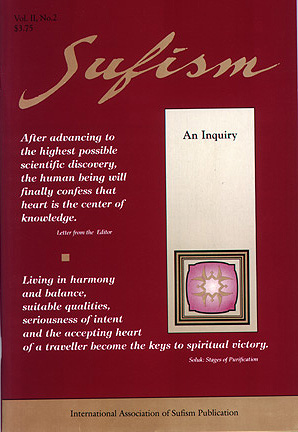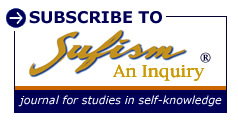|


Editor's
Note is a quarterly column with inspirational words of wisdom from
the Editor-in-Chief of Sufism: An Inquiry, Shah
Nazar Seyed
Dr. Ali Kianfar.
Can
We Step Beyond Our
Limitations
Editor's
Note
from Vol. 9, No. 4
An
Essential Principle of Sufi Teaching
Editor's
Note
from Vol. 6, No. 3
Tariquat:
Way
Editor's Note from
Vol.8, No.2

Contact
Us:
Sufism Journal
14 Commercial Blvd.
Suite 101
Novato, California
94949 USA
Tel: +1 415 382 SUFI
Tel: +1 415 382 7834
eMail: sufismjournal@ias.org
The
Sufism Journal is a publication
of the International Association of
Sufism, a non-profit organization
affiliated with the United Nations.
The
various articles presented
here represent the individual
views of their authors. SUFISM
does not imply any gender bias
by the use of feminine or
masculine terms, nouns
and/or pronouns.
©
Sufism Journal and the
International Association of
Sufism. All rights reserved.
|
|
|
|
|
Knowledge
is the light
that God pours
into the heart
of whoever He Desires
From
Vol. 2, No. 2
by
Shah Nazar Seyed Ali Kianfar
It
has been said that the human mind and the agents of thought are
unable to understand and think of the Essence of God.
According
to the Sufi teachers, knowledge is a divine ray that enters the
heart of the salek after his participation in correct practice
and worshiping and meditating out of love. Mind will also be
|

|
|
illuminated
by this knowledge through the salek's striving and finally
the striving human being will become the manifestation of that knowledge.
This
way of understanding leads us to put aside our ordinary way of thinking
about what knowledge is. This is no easy task, so bound up are we
in our ways of thinking. We can state the realization that knowledge,
according to Sufis, must be discovered, that the center for its
discovery is heart, and God is its provider. But when we try to
truly understand even this simple statement, we realize the extent
to which our thinking about knowledge is narrowly circumscribed.
This is why divine knowledge has been called the knowledge of heart
in Sufism, to express its radical difference from the knowledge
of mind or acquired knowlege which is the knowledge learned through
mental perceptions where the organs of the senses work as the providers.
Philosophers
and experimental scientists have believed that acquired knowledge
is a relative knowledge since the agents that gather this knowledge
the human sense have as their role the experience of the surface
of things. Their various findings are compared only relative to
one another, for the sake of a reasonable conclusion. Such relative
knowledge is general information and lacks absolute result since
a future finding may change any present conclusion. Therefore, relative
knowledge will not lead us to the reality of things as those things
really are.
On
the contrary, the knowledge of Sufis, the knowledge of the heart,
has always had the absolute authority that derives from being outside
the world of change. It is a fixed and unchangeable knowledge that
has been instructed and explained by Sufis over fourteen centureis.
Sufi findings and discoveries are so unique and powerful that they
have the character of rules and laws for those who enter an inner
path. Sufi masters have invited humanity to these instruction in
order that all may discover and share in the knowledge of heart.
The method of their striving, their beliefs and their harmony and
balance are very close to those of the prophets. For example, the
life story of Christ and his faithfulness even in the face of danger
and finally his crucifixion are very similar to that of Mansur al-Hallaj,
the great Sufi of the eighth century.
When
Mansur announced, "I am the truth" he was accused of blasphemy
and was sentenced to death by those who did not understand the implications
of his statement that even an individual human being can so realize
truth as to become its expression. Statements such as "I am
the truth," or "the kingdom of the heavens is like a grain
of mustard seed . . ." have been announced as well by other
spiritual teachers who make these statements worthy of analysis
and understanding. And indeed, much understanding is vital to realize
the truth of heart, to go beyond the mere repetition of the words
of the great individuals. When
Mansur announces, "I am the
After
advancing to the
highest possible scientific
discovery, the human being
will finally confess that heart
is the center of knowledge |
truth," the truth he utters must necessarily require much
more for its understanding thn the truths of daily life, or
even the complex truths of science. Yet like all tellers of
truth, he has the ability to prove such a statement to those
capable of understanding. |
In
the history of Sufism there have been many events such as that of
Mansur. Sufis have always been considered revolutionaries of their
times, and as such have been oppressed by people's empty words and
superficial science . . .
To read the rest of this article,
press the subscribe button below and order
Volume 2, Number 2 from our Archive Page,
and while you are there you can subscribe
so you never miss another issue!

|
|
|
|

![]()
![]()




